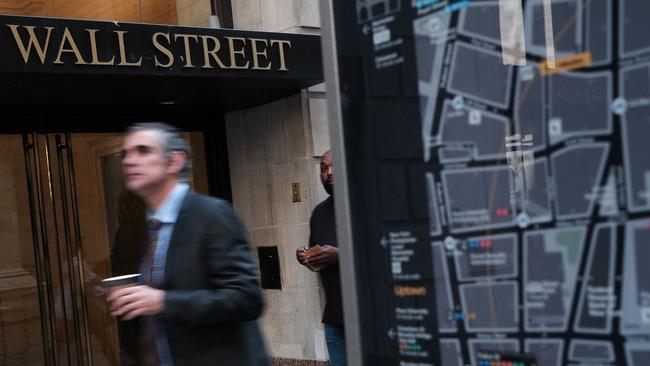Shares priced for perfection but bond markets say otherwise, warns JPMorgan
A disconnect between the global equity and bond markets has widened in recent months, says JPMorgan.

JPMorgan says a “disconnect” between the global equity and bond markets has widened in recent months, with bonds now implying 20 per cent downside risk for equities.
Bond markets are priced for a “sustained period of elevated macroeconomic uncertainty”, but equity markets are “priced for perfection”, with the S&P 500 now trading above its fair value, according to the US investment bank’s head of global derivatives strategy, Nikolaos Panigirtzoglou.
His long-term fair value model and survey-based measures of term premiums – estimates of the compensation required for bearing the risk that interest rates may change over the life of the bond – suggest there’s a “large disconnect between bond and equity markets in terms of pricing macroeconomic uncertainty, and if anything this disconnect widened in recent months”.
His comments came as the S&P 500 closed at its highest level in 10 months amid further gains in the technology sector.
The US 10-year Treasury bond yield hovers around 3.75 per cent after rising from recent low of 3.25 per cent as the regional banking crisis eased and the Fed continued to lift rates amid high inflation.

“If equity markets were to price in a rise in inflation volatility to levels consistent with what bond markets appear to price in, this would imply around 20 per cent downside from current levels,” Mr Panigirtzoglou said.
Or if the US bond market ignored the rise in inflation volatility since early 2021, the 10-year real (inflation adjusted) US Treasury yield should decline by about 70 basis points, he added.
Meanwhile, equity markets in the euro area were “pricing in little recession risk whether one looks at the overall index level or cyclical versus defensive sectors”.
The warnings came as revisions to eurozone economic data showed the trading bloc entered a technical recession – defined as two consecutive quarters of negative economic growth.
Mr Panigirtzoglou noted that, while the markets over the past few months experienced the shock of banking stress after the collapse of Silicon Valley Bank, and fraught negotiations over the US debt ceiling, US equities made new nine-month highs, even as bond yields were relatively range-bound.
“Given this has taken place against the backdrop of persistence in inflation, this has raised questions in our conversations again over how much macroeconomic uncertainty is priced in bond and equity markets,” he said.
The Australian sharemarket stayed above last week’s low amid a buoyant US market this week.

But it retreated from its highest level so far this month amid a sharp rise in bond yields as economists revised up their projections for interest rates and the risk of a domestic recession following a largely unexpected interest rate rise and hawkish guidance from the Reserve Bank.
Goldman Sachs and Capital Economics predicted the RBA’s cash rate would hit 4.85 per cent in the next three months versus the current level of 4.1 per cent. Most see at least one more rate rise.
Economists also lowered their economic growth forecasts, with AMP Capital, CBA and HSBC warning of a sharp increase in the chance of a recession in the next 12 months.
“The 4 per cent increase in interest rates since May last year means it is becoming much harder for the economy to remain on an ‘even keel’ as the RBA and most are forecasting, and runs the real risk of tipping the economy into a recession, which we assign a 50 per cent risk to in the next 12 months,” AMP Capital senior economist Diana Mousina said.
CBA saw economic growth of just 0.7 per cent on-year in 2023 and 1.9 per cent in 2024. It saw a 50 per cent chance of a recession this year as the lagged impact of rate rises continues to hit the cashflows of indebted households.
“Broadly flat real household consumption over the remainder of 2023 sits at the heart of our forecasts for the economy to grow significantly below trend and be in a per capita recession for the remainder of this year,” said CBA head of Australian economics Gareth Aird. “Monetary policy is now deeply restrictive, which means by definition the economy will slow materially from here.”

CBA said the RBA could lift rates in August as well as July, taking the cash rate to 4.6 per cent.
It pushed out the timing for its expectation of the start of interest rate cuts to late next year. CBA saw 125 basis points of rate cuts next year, lowering the cash rate from 4.35 per cent to 3.1 per cent.
HSBC Australia chief economist Paul Bloxham also predicted a terminal RBA rate of 4.35 per cent, while warning of a “risk of a further hike to 4.6 per cent beyond this”.
Mr Bloxham said he saw a 50 per cent chance of recession, and cuts in the cash rate down to 3.5 per cent late next year.
He cut his growth forecasts to 1.2 per cent for 2023 and 2024, versus previous forecasts of 1.6 per cent for both, and saw growth averaging just 0.1 per cent per quarter for the next four quarters.
“Despite the fact that the RBA’s tightening is already slowing growth and that much of the effect of the already delivered tightening is yet to fully flow through to the economy, it seems the central bank has lost patience with waiting for inflation to fall,” Mr Bloxham said.
“We see this as meaning that another rate hike is now likely in the coming months.”




To join the conversation, please log in. Don't have an account? Register
Join the conversation, you are commenting as Logout